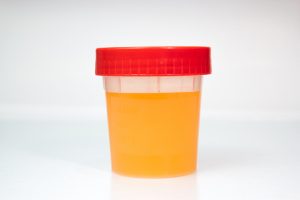
Causes of dark urine
Alkaptonuria: A rare hereditary disease that is caused by the accumulation of homogentisic acid in the body. The body’s inability to convert tyrosine—an amino acid—into its final component leads to alkaptonuria because the body is lacking an important enzyme.
Anemia: There are many different causes of anemia. Hemolytic anemia results from the breakdown of red blood cells. This can lead to the formation of red or dark colored urine, with traces of blood in urine samples.
Porphyria: A rare hereditary blood-related disorder that causes a defect in hemoglobin synthesis. Symptoms of this condition often include abdominal pain, sensitivity to light, and possible seizures and mental disturbances.
Urinary tract infection (UTI): Infections of the urinary tract can cause the color of urine to turn from slightly yellow to an abnormal, cloudy consistency. The urine may also look darker. UTIs are often caused by bacteria or yeast infections and commonly affect more women than men.
Liver conditions: If urine is dark and the skin or eyes appear yellow, you may have jaundice, which is a condition signifying a liver problem. Dark urine can also be a sign of hepatitis, which is an inflammatory condition of the liver. Alcoholic liver disease also causes dark urine.
Jaundice: Jaundice is the yellowing of the skin or the eyes. It is a symptom of a liver problem. If urine is dark and the skin or eyes appear yellow, then it could be an indication of jaundice.
Dehydration: When you are well hydrated, your urine is a light yellow or even clear. The more dehydrated you are, the darker your urine will be. If you begin to feel confused, dizzy, or even faint, these are indications of a serious dehydration. Ensure you stay well hydrated to prevent dehydration.
Hepatitis: Dark urine can be a sign of hepatitis which is an inflammatory condition of the liver.
Cirrhosis: Cirrhosis is a type of liver disease in which scar tissue begins to take over healthy tissue, so the liver is unable to function properly.
Gallstones: Gallstones commonly form from cholesterol in the gallbladder. Along with dark urine, you may also experience abdominal pain, fever, itchy skin, and jaundice.
Bile duct obstruction: The bile ducts carry bile to the intestines to aid in digestion. If these ducts are blocked, not only will your urine appear dark, but you will experience digestive issues as well.
Heat emergencies: Getting overheated due to prolonged sun exposure or hotter temperatures can speed up dehydration, which can result in dark urine or fainting.
Chlamydia infection: Chlamydia is a sexually transmitted infection that requires immediate treatment or else complications can arise.
Alcoholic liver disease: This condition results from high intake of alcohol over several years. The liver becomes damaged and, thus, its function becomes impaired. Alcoholic liver disease can progress into liver cirrhosis.
Bladder stones: This results for crystallized matter left in the bladder. Over time, bladder stones can cause damage to the bladder or even lead to an obstruction of the urinary tract.
Acute pancreatitis: This is inflammation of the pancreas which will lead to pain and swelling of the upper left side of the abdomen, along with nausea, burping, and dark urine.
Food: Some foods we eat can change the color of our urine. These include aloe, fava beans, rhubarb, and sorbitol. The addition of food coloring like anthocyanins and curcumins in food can also lead to dark urine.
Medicinal causes: Some chemicals found in common medicines can contribute to dark urine. These include iodine, anti-malarials, senna/cascara, phenol poisoning, and methocarbamol. Some vitamin supplements can also lead to dark urine
What Causes Dark Urine in the Morning?
Dark urine first thing in the morning is most commonly caused by lack of hydration. While you sleep, you’re not intaking fluids, which can cause your urine to be more concentrated. Thus, your first urination in the morning will appear the darkest and gradually lighten as you consume more fluids throughout the day.
What Does Dark Urine in Pregnancy Mean?
In pregnancy, dark urine can also be a result of a lack of hydration, especially because pregnant women require more fluids than non-pregnant women. Lack of hydration can also result from morning sickness, which is a common sign of pregnancy.
If your urine still appears dark even after plenty of water intake, it could be a sign of a liver problem.
Treatment and prevention of dark urine
When seeing dark urine, first consider what foods you have recently eaten, what medications you are on, and whether you have been drinking water regularly. Food and hydration are causes of dark urine that you can easily address on your own. If none of the three listed above apply, you will want to see your doctor.
Your doctor will most likely perform a physical examination along with corresponding tests in order to uncover the cause of your dark urine.
Treatments for dark urine depend on the cause. For example, treating liver disease, bladder stones, or acute pancreatitis. All of these conditions have specific treatments which your doctor will outline and explain to you.
Preventing dark urine initially consists of staying well hydrated. Aside from that, it’s important to live a healthy lifestyle and prevent other conditions that can contribute to dark urine. This involves reducing your risk of infection, along with keeping the liver healthy by eating well, exercising regularly, and reducing your alcohol intake.
When to call a doctor for dark urine
You should see your doctor right away if blood is present in your urine as this can be an indication of different cancers. If you are drinking enough water and your urine is still dark, you should also see your doctor.
Lastly, if pain or yellowing of the skin accompanies your dark urine, you should seek medical attention right away.
Also Read:
- Frequent urination: Causes, symptoms, diagnosis, and treatment tips
- Cloudy urine: Causes, symptoms, and treatments
- pH Levels in Urine: Foods That Change Urine pH Levels